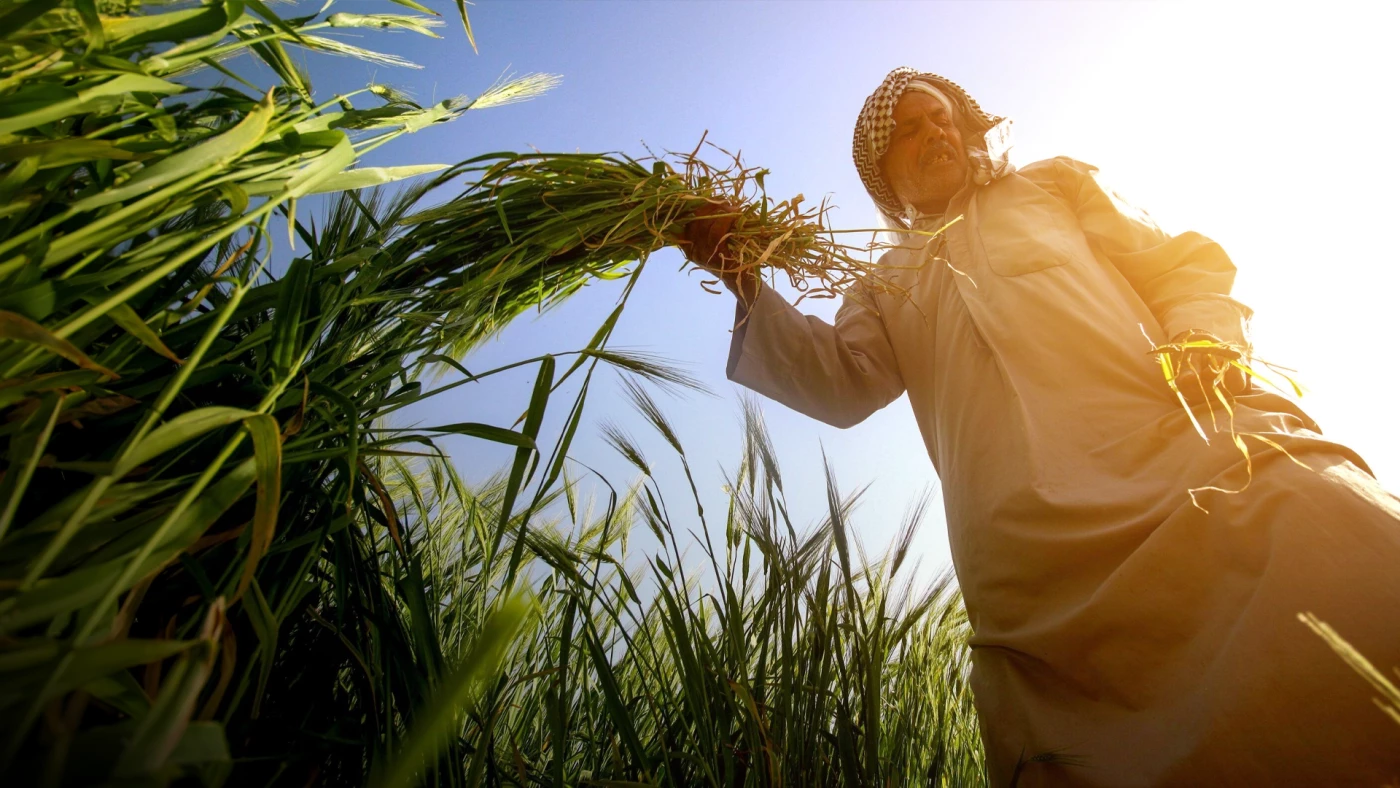Faced with persistent drought and declining financial returns, farmer Samir was compelled to sell his 80-donum (20 acre) orchard. He transitioned to a more stable source of income by purchasing and renting out residential units.
Samir Kashkoul, a 52-year-old farmer from Baghdad, inherited the family trade from his father. In an interview with The New Region, he explained the factors that led to his decision. "We've struggled with inadequate water for irrigation since 2003, causing the trees and crops to die," he said. "On top of that, the electricity supply is severely limited. We get power for just one hour a day, which isn’t enough to run water pumps and sustain the orchard. This has forced many of us to give up farming.
"The Ministry of Agriculture’s staff do not engage with farmers or conduct field visits to address critical issues like water shortages and electricity supply, which are vital for farming's success in the country." He also pointed out that "some agricultural committees conduct brief visits without providing any solutions for these problems, nor do they address diseases affecting the trees. Additionally, there is no compensation for farmers facing adverse weather conditions, leading to significant losses when profits were expected."
Samir, who originally owned six thousand date palms and numerous citrus, apricot, peach, pear, and other trees, said, "Farming used to generate substantial income annually when the country was stable and there were no water problems.
"Due to electricity outages and water shortages, the vast majority of my palm trees died, leaving only 300 of the original six thousand. Despite numerous appeals to the Ministry of Agriculture for help, nothing was done." Samir also pointed out that "soaring land prices are driving farmers to sell their farms and leave agriculture altogether. The price of one donum of agricultural land has skyrocketed to approximately 450 million dinars, from just eight million dinars."
Razing and repurposing agricultural land is going on amid an unprecedented drought across the country, drastically reducing orchards and agricultural lands, especially in the governorates of Baghdad, Diyala, and Basra.
The bulldozing converts agricultural lands into residential plots and commercial complexes, significantly reducing green spaces.
Water Resources Minister Aoun Diab has reported that extensive orchards in Baghdad and other governorates have been bulldozed and converted into commercial spaces.
Despite government pledges to increase green spaces, the destruction of orchards continues. In Baghdad, vast agricultural lands that once spanned wide areas have been replaced by residential buildings and commercial shops.
Agricultural and water expert Tahseen Al-Khafaji explains: "Bulldozing is driven by water scarcity and the encroachment of agricultural lands for residential and commercial development. This has resulted in the loss of green belts and an increase in dust storms, now numbering up to 120 annually."
Al-Khafaji further noted that "farmers who once cultivated vegetables and produced dairy products, the backbone of food security, have abandoned their fields and moved to other cities. This migration disrupts social stability and creates various socio-economic problems.
"The government should have chosen non-agricultural areas outside Baghdad for investment, housing, and commercial projects. Converting agricultural land is a complex process requiring specialist measures, as the land loses its agricultural properties. Unfortunately, neither the government nor investors have followed any proper procedures after converting these lands."
Former Agriculture Minister Mohammed Karim Al-Khafaji stated that Iraq has approximately 32 million donums of agricultural land, but only 18 million donums are currently in use.
In an exclusive statement to The New Region, Ali Al-Shammari, Director General of the Agricultural Land Department at the Ministry of Agriculture, confirmed that a recent survey revealed that 80,000 donums of agricultural land have been razed. Historically, Iraq had up to 51 million donums of agricultural land.
Al-Shammari highlighted that the governorates most affected by the bulldozing are Baghdad, Nineveh, Basra, and Diyala. He accused some farmers and citizens of lacking national concern, selling the land for residential and commercial conversion.
The destruction of agricultural land has also negatively impacted livestock farming, with many cattle and sheep farmers abandoning their trade. These farmers, who once supplied Iraqi markets with milk, yogurt, cream and cheese, have now turned to other professions.
Sakban Mahawish, a 62-year-old farmer from the outskirts of Al-Shaab in Baghdad, shared his experience: "My 64-donum farm was once lush with various fruit trees and vegetables and housed many animals, including sheep and cows. We sold their dairy products in the markets daily." In an exclusive interview with The New Region, he recalled, "Every dawn, we would drive to the markets to sell our produce—tomatoes, potatoes, vegetables, fruits—alongside milk, yogurt, cream, and other products. The income was high and reliable. But severe drought and water shortages caused our crops to wither and fail. This forced me and many other farmers in the area to sell our agricultural land and livestock and turn to different commercial opportunities for survival."
In the same vein, agricultural and environmental expert Haider Haqib, speaking to The New Region, said "The bulldozing of agricultural land has led to numerous problems. The government has overlooked the rapidly increasing population, which grows by about 250,000 people annually, and has failed to provide adequate solutions for housing issues." He pointed out that "the unplanned conversion of thousands of hectares of orchards and green spaces into residential complexes has severely impacted the environment. Green areas, which once served as vital breathing spaces for city residents, and productive orchards, which significantly contributed to the country's food supply, have been lost."
Haqib highlighted the environmental damage caused by the transformation of agricultural lands into residential areas. "The residential developments that replaced green spaces are not environmentally friendly. The oxygen levels that plants in these areas used to provide have significantly dropped, while carbon dioxide emissions have increased due to factories encroaching on former agricultural zones," he explained. Haqib also noted the negative impact on local biodiversity, with the displacement of birds and animals that once thrived in green areas, exacerbating the effects of climate change.
Legal expert Jamal Al-Asadi, in an exclusive statement to The New Region, underscored the absence of comprehensive legislation in Iraq concerning the bulldozing of agricultural lands. "Unlike other countries, Iraq lacks specific laws to address the bulldozing of agricultural lands," he said. Al-Asadi pointed out the inconsistency in legal provisions, which fail to impose adequate criminal and civil penalties on those who encroach on agricultural lands or alter their use and value.
Al-Asadi pointed out that Iraq previously had laws, including the Penal Code related to real estate, which encompassed land and buildings. "Article 457 criminalizes anyone who disposes of property they do not own if it harms others or the original owner, given that most agricultural lands are owned by the Ministry of Finance," he explained.
He further noted that this article could be applied to agricultural lands. Additionally, Article 477 imposes a prison sentence of up to two years and a fine for anyone who damages property they do not own or renders it unusable. Al-Asadi confirmed that if the agricultural lands are owned by the Ministry of Finance or are under an agricultural contract, this article could be enforced against violators. However, he emphasized that there are no specific legal provisions criminalizing the exploitation and change of use of privately-owned agricultural lands.



 Facebook
Facebook
 LinkedIn
LinkedIn
 Telegram
Telegram
 X
X


